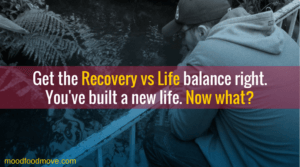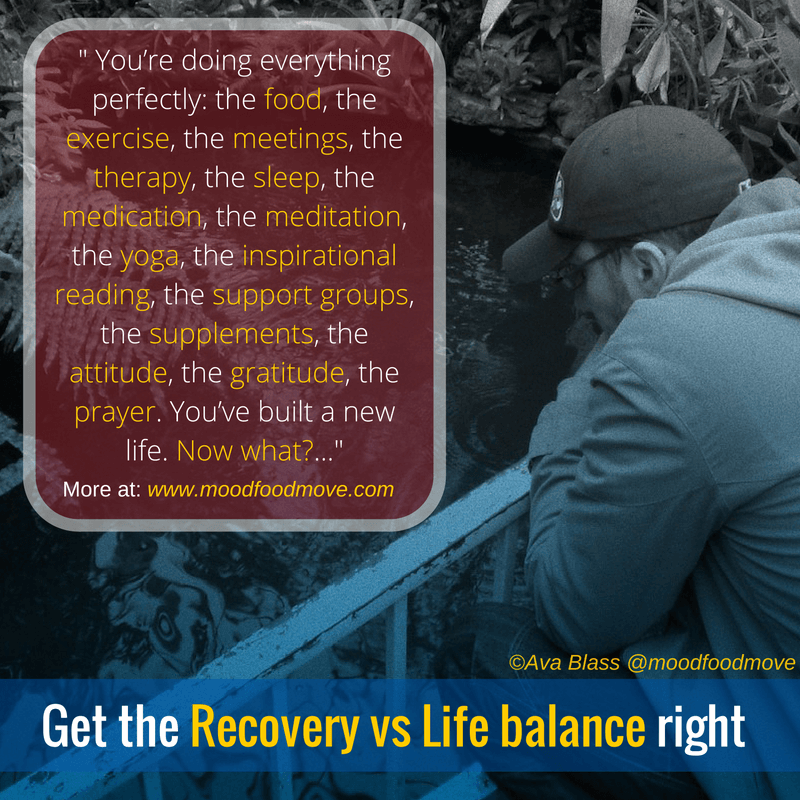 You’re doing everything perfectly: the food, the exercise, the meetings, the therapy, the sleep, the medication, the meditation, the yoga. And furthermore you’re committed to the inspirational reading, the support groups, the supplements, the attitude, the gratitude, the prayer. You’ve built a new life. Now what? It’s time to get the life vs recovery balance right.
You’re doing everything perfectly: the food, the exercise, the meetings, the therapy, the sleep, the medication, the meditation, the yoga. And furthermore you’re committed to the inspirational reading, the support groups, the supplements, the attitude, the gratitude, the prayer. You’ve built a new life. Now what? It’s time to get the life vs recovery balance right.
The big question to ask yourself is: Can I look into the future and see myself continuing in this way?
We begin with a manic defense of over-compensation
Living with a mental health disorder like depression, stress, or addiction is a grim existence. A common time for us to desperately seek out help is after having suffered a nasty collapse of some sort. We are propelled out of that dismal low into a manic defense of rigorous over-compensation of positive actions. There’s no way on God’s Earth that we want to go back to living and feeling like that. And so we’re driven to do everything in our power to make sure we don’t.
I myself have a history of this recovery pattern. I bounce along the rock-bottom for months, until hit by a lightning bolt of self-awareness. This catalyzes me into gotta-do-everything-to-get-better. I have extreme focus, extreme motivation, extreme discipline. I become a Recovery Poster Child. I receive the oohs, ahhs, and back-pats from therapists, doctors, and fellow support group members for how well I am doing.
Aim for a balance, where you can lightly manage your recovery
It is true that you won’t recover if you keep doing the same things – in the same way, with the same people – as you did when your mental health disorder was winning the battle for your soul. No, you can’t recover if you keep the same previous lifestyle and habits. But equally you won’t recover if you tip too far the other way.
Recovery has to be sustainable the answer we get to the earlier question “Can I look into the future, and see myself continuing like this?” has to be Yes.
We are aiming for a balance where you can lightly manage your recovery, so that you have plenty of room to enjoy your happy healthy life.
What we are trying to avoid is applying the same desperation to recovery, that we applied to the flailing mess of our depressed/addicted/stressed life. Swapping all-consuming misery for an equally all-consuming obsessive recovery is a problem, if you leave no room for anything else (i.e. a life).
However, let me add a caveat
All of us go through a learning curve in early recovery where all our time and focus has to be on recovery. We take it seriously. We swap the hours formerly spent boozing – or coiled in fetal position, crying. And fill them with meetings, appointments, and developing positive lifestyle habits like good food, exercise, meditation. We have to, and need to, and must, prioritize these things. The rest of our life has to fade into the background whilst our new life takes purchase. It’s a vulnerable time, and we need to give ourselves time to bed in our recovery life.
There are many instances where channeling our all energies into a new healthy obsession bears very ripe fruit: running, vegan, yoga, meditation. These people have forged new identities as ultra-marathoner, vegan-athlete, yoga teacher etc, from the embers of junkie, booze-hound, depressive. They have shed their old skin, and assumed a new positive form of themselves. If that feels right for you, consider it carefully.
Be wary of an obsessive-perfection creeping in
Please be wary of something I myself have done this many times, until I found the middle-way. Be careful to not fill all your time with recovery-related activities – as a way to plug up the holes where addiction/depression/stress once got in. I’d become twitchy and anxious if I couldn’t go for a run, or I didn’t have my smoothie for breakfast. Or if something threatened to interfere with my meditation time, or reading time, or scheduled meal time. This perfectionism was destructive, because it gave me no room for mistakes, for learning, or for accommodating change.
Can you see what I am saying? Is swapping your destructive lifestyle for the gilded cage of obsessive-perfection really contributing to better mental health? What you’ve created is a different mental health issue. It’s akin to swapping a nasty junk food diet for the obsessively clean-eating misery of orthorexia.
The answer is to trust yourself
So, what is the answer? How do you get the recovery vs life balance right? The answer is to trust yourself. Allow yourself to find a happy medium with your routine. Trust yourself that you’ll find a routine that honors what you want to achieve. Once you’ve mastered the ropes of what you need to be safe and healthy, loosen them enough to support you… but not enough that you fall through.
Take good care of yourself
Ava 🙂
*This article was written when moodfoodmove’s focus was people affected by depression and addiction. Whilst we very much still care about this group, our advice re taking better care of yourself (via good nutrition, healthy lifestyle and a positive mindset) applies equally to all of us. We ALL need to take better care of ourselves.

